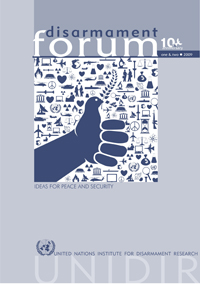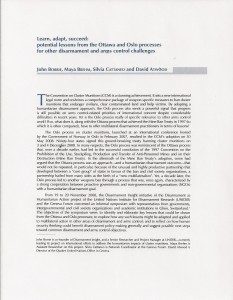
SANCTIMONEOUS HERESY: Right-wing Israelis demonstrate in Jabal Mukabber after hundreds ransacked the village in occupied East Jerusalem, destroying Palestinian property, March 2008. (Meged Gozani/Activestills)
A third uprising?

SANCTIMONEOUS HERESY: Right-wing Israelis demonstrate in Jabal Mukabber after hundreds ransacked the village in occupied East Jerusalem, destroying Palestinian property, March 2008. (Meged Gozani/Activestills)
A third uprising?

The United Nations Institute for Disarmament Research (UNIDIR) and its formal but free online publication, Diarmament Forum, the cover is shown to the left here, linking to the Forum's home page, is the model for the Journal of Public Intelligence.
Today we are creating a new section for the Journal, “Worth a Look,” which will point to relevant scholar-practitioner publications that make a contribution to the emerging and converging disciplines of Collective Intelligence, Public Intelligence, Cognitive Science, and Global from Local Public Administration, the latter the ultimate constituency for the Journal of Public Intelligence.
Below is the first page and link to the seven-page UNIDIR article, “Learn, adapt, succeed: potential lessons from the Ottawa and Oslo processes for other disarmament and arms control challenges.”
We note with special interest the importance of informal trust networks that are by, with, of, and BEYOND all bureaucratic entities.

Protection Rackets
By Christopher Dickey | Newsweek Web Exclusive
Jul 31, 2009
In Afghanistan, Americans should deploy Pvt. Social Worker and Maj. Sociologist.
PBI: The conclusion first:
“You have to learn to discriminate if you're going to win,” said Villalobos. “And in Afghanistan, that's the problem. You don't know how to do that. You don't speak the languages; you don't understand the cultures. And then you have two other problems. First, you are the invader, the outsider.” And that's not going to change. “And second, you add to this the problem with your own record of human-rights violations.” Villalobos mentioned the Iraq horror picture show at Abu Ghraib in 2004 and the long history of abuses at the Bagram military base.To achieve anything in that sort of environment, soldiers have to be willing and able to move around among the public. But the “force protection” that is at the heart of so many U.S. military tactics and procedures makes that awkward if not impossible. You can't convince the people you can protect them from the insurgents, after all, if you look like you're not sure you can protect yourself. They just ask why you're there in the first place. And that question is increasingly hard to answer.
PBI: Now the middle meat:
“Afghanistan,” said Villalbos, “is super complicado.”
“In the old days, your problem was to defeat the enemy, and it didn't matter which way you did it,” the veteran guerrilla told me. “We had rural societies that were cut off from each other; you could eliminate your enemies without people seeing, and you could create a long peace that way. But in a world that is more interconnected, the idea of human rights has become more universal, and there has developed a direct relationship between human rights and military effectiveness.” Is McChrystal reading Villalobos? They seem to be very much on the same page.
As Villalobos sees it, the power to intimidate is much more limited than it used to be, and the risk of too much intimidation is that you will scare civilians right into the arms of your enemies. (Indeed, this was one of Al Qaeda's big mistakes in Iraq.) “Too much discussion about human rights has been about ethics,” said Villalobos, “and it's not only an ethical problem, it's an operational problem. The army of the future needs officers that are sociologists and soldiers that are social workers.
PBI: Read the beginning and other bits by clicking the Newsweek logo.
+++++++Marcus Aurelius Comment+++++++
Quite possibly, much of the force protection problem can be traced to a terrorist attack on a US bus Honduras in the late 1980s. That influenced future Southern Command (Latin America) commander GEN George Joulwan who later was European command commander during the Balkans interventions. GEN Joulwan's very robust view of force protection arguably set the tone for much of what our forces are doing today in the CENTCOM AOR.
+++++++Phi Beta Iota Editorial Comment+++++++
“Force Protection” is code for “Friendly Casualty Aversion” as well as the US Army's old mind-set of not allowing commanders any latitude in the way of mistakes–zero tolerance paved the way for micro-management and micro-reporting, and that is how the US Army trains, equips, and organizes. It became effective at killing indiscriminately and very ineffective at winning and holding ground and the hearts and minds on that ground. The Battle of Jutland and the “Rules of the Game” lessons learned and not learned by the British Empire apply equally to the American Empire. What this boils down to is that the Americans have substituted technology for thinking and doctrine for strategy. There is no good strategic reason for being in Afghanistan, nor is there a good strategic reason for continuing to spend $1 trillion a year on a 1950's force structure model, and now toward $90 billion a year on a secret intelligence community optimized to cover Soviet communications and little else. At the same time, between partisan ideology, Wall Street special interests, and bureaucratic corporatism, US foreign policy can safely be said to be–we quote Madeline Albright–the equivalent of “gerbils on a wheel.” See the other book below by Morton Halperin, a book that includes as one of the “rules of the game,” “Lie to the President if you can get away with it.” With a lack of integrity so prevasive, America is her own worst enemy.



Franklin “Chuck” Spinney is living the dream sailing in the Mediterranean with his forever spouse and a dog that is all bark and no bite. He remains the “last man standing” from the whistle-blowing era of the 1980's when giants like Colonel John Boyd tried to force the Pentagon to get a grip on reality. As we like to point out, we lost over 1,000 tanks by D-Day +2, today the Air Force is happy with 200 really expensive, really complicated fighters that do not perform as advertised and are not relevant to 90% of our needs.
Today Chuck, whom we are proud to call a friend and mentor, takes on the core issue of translators, the DoD translator hiring program, and the question of whether the chain of command from the force commanders in the field through the US Central Command into the Pentagon, and over to the National Security Council had any idea at all: a) that competent real-time field translation is the center of gravity; and b) that we suck at it.
Below are a couple of paragraphs, followed by the CounterPunch logo link to the full Spinney unleashed story, and a Frog Right link to the Phi Beta Iota highlighting of the Associated Press story that set Chuck off.
One last comment: Winston Churchill understood America, the land that gave the world his mother. He liked to say “Americans always do the right thing–they just try everything else first.” So it has been with talking to imams and tribal leaders in Iraq, so it is now with translators. Many of us have been saying for two decades now that we need to get a grip on the 183 languages we do not speak, and contractors hired under criminally negligent conditions simply will not do. Phi Beta Iota can solve this problem in 90 days. We are not holding our breath waiting for a call from the Pentagon.
+++++++Begin Spinney Unleashed+++++++
. . . . . . .
The requirement for alien outsiders to blend in with xenophobic insiders embodies another requirement: to succeed, blending at the tactical level must be expanded gradually and seamlessly to the strategic level of the conflict. But for this kind of bottom-up evolution to take place, at least two other conditions must be satisfied: First, troops at the lowest level of tactical organization must have the linguistic capabilities needed to communicate effectively with the locals in their own language and dialect. Second, the troops must be given enough time to evolve success from the bottom up, that is, by insensibly synthesizing the empathy skills needed to expand their blending operation from the clan/village level to the tribal/provincial level to the national level. If nothing else, Obama's reincarnated ink spot strategy is based on the belated recognition that Bush's seven-year strategy of trying to procure success brutishly from the top down in Afghanistan has not worked — a point made painfully clear by the rejuvenation of the Taliban in the presence of American strategy to prop up the corrupt and inept administration of its protege Hamid Karzai.
Naturally, given the central importance of (1) linguistic skills and (2) time to the success of the “new” counterinsurgency strategy, one would have thought that the Generals who sold President Obama on the new strategy appreciated both fundamental requirements and made robust provisions for providing the minimum essential building blocks to the front-line troopers tasked by the Pentagon to “shape cultural terrain” at the pointy end of the spear.
. . . . . . .
So, how is the first and most basic necessary condition, namely the provision of linguistic capabilities, playing out in field and back home in Versailles on the Potomac?
A shocking AP Report by Jason Sraziuso describes a horrifying situation in the field. While recruiting statistics suggest, at least to the mindless bean counters in Versailles, that linguistics capabilities are building up rapidly, the information in Sraziuso's report reveals this to be a sham. Sraziuso describes how the Pentagon's brass hats have created and reinforced a translator crisis by relying on unscrupulous contractors to provide the crucially needed linguistics capabilities. In effect, the brass hats have made a mockery of their own strategy by short shrifting its most basic building block. Moreover, by privatizing the translator requirement, they are making an oxymoronic policy decision that effectively says the centrally important assumption of the new blending strategy — basic linguistic skills — is not important enough to be provided for in-house.
But there is more. Sraziuso goes on to show how the oxymoron is playing out in the real world of Pentagon contracting: The contractors have used false pretenses to recruit large numbers of unqualified translators. Recruiters tell prospective translators that they will not be placed in harms way, yet the the strategy requires the translators to be on the pointy end of the spear at the squad level. Recruiters are accepting translators who are physically unqualified; some are in their 60s and 70s, have not been required to pass physical fitness exams, have heart conditions, or are not acclimated to the effects of searing heat and high altitude. Yet upon arrival in Afghanistan, these recruits discover they are expected to hump it with the grunts. Not surprisingly, many quit. Incredibly, Sraziuso cites instances where recruiters have recruited translators with the wrong language skill — e.g., recruiting Dari-only speakers to translate Pashto. An, oh by the way, the whole process is greased Pentagon-style with gobs of money: Class II translators are bribed to join in this sham with base salaries of over $210,000 per year. No doubt, these a little research would find that these exorbitant salaries inflate profits, because they are added to the companies' cost bases, which are used in the cost-reimbursement clauses of cost-plus contracts. Despite such bloated salaries, many translators quite sensibly call in sick or quit, once they realize what they have gotten into. Not surprisingly, soldiers also told Sraziuso they are being endangered by this incompetent give way, because when the translators can not talk to locals, they can not provide the local intelligence needed by the soldiers to avoid ambushes and boob traps. The greater strategic requirement to blend into and build empathy with the local cultures is not addressed by Sraziuso, but the implication is clear.


After spending a week traveling the frontline of the “war on terrorism” — from the aircraft carrier U.S.S. Ronald Reagan in the seas off Iran, to northern Iraq, to Afghanistan and into northwest Pakistan — I can comfortably report the following: The bad guys are losing.
Yes, the dominos you see falling in the Muslim world today are the extremist Islamist groups and governments. They have failed to persuade people by either their arguments or their performances in power that their puritanical versions of Islam are the answer. Having lost the argument, though, the radicals still hang on thanks to gun barrels and oil barrels — and they can for a while.
. . . . . . .
To the extent that the radical Islamists have any energy today, it comes not from the power of their ideas or examples of good governance, but by stoking sectarian feuds. In Afghanistan, the Taliban play on Pashtun nationalist grievances, and in Iraq, the Sunni jihadists draw energy from killing Shiites.
The only way to really dry up their support, though, is for the Arab and Muslim modernists to actually implement better ideas by producing less corrupt and more consensual governance, with better schools, more economic opportunities and a vision of Islam that is perceived as authentic yet embracing of modernity. That is where “our” allies in Egypt, Palestine, Iraq, Afghanistan and Pakistan have so consistently failed. Until that happens, the Islamist radicals will be bankrupt, but not out of business.
+++++++Phi Beta Iota Editorial Comment+++++++
Most readers will focus on the beginning of Friedman's story and completely miss the ending. What Friedman does not state that needs stating over and over again is that the U.S. taxpayer is being cheated by a foreign policy that substitutes technology for thinking, military sales for strategy, and convenient dictators for democracy. Until we have an Undersecretary of State for Democracy with one Assistant Secretary for those dictators that agree to a five-year exit strategy, another for those that do not; and a counterpart Undersecretary of Defense for Peace who can move beyond the lip service that Defense continues to give to Operations Other Than War (OOTW), Stabilization & Reconstructions (S&R), Humanitarian Assistance (HA), and the mother of all military strategies, Irregular Warfare properly defined as Waging Peace by All Means Possible, we will continue to betray the public interest at home as well as abroad.
Click on NYT Logo Above for the Full Story Online.

Our policy is to point to the original full sotry online whenever the source offers a persistent URL that does not require registration. Below are extracts from Tom Friedman's “The Class Too Dumb to Quit,” as flagged by Marcus Aurelius, pseudonym for a Special Operations officer with decades of HUMINT abroad.
EXTRACTS:
This scene is a reason for worry, for optimism and for questioning everything we are doing in Afghanistan. It is worrying because between the surges in Iraq and Afghanistan, we are grinding down our military. I don’t know how these people and their families put up with it. Never have so many asked so much of so few.
The reason for optimism? All those deployments have left us with a deep cadre of officers with experience in Iraq and Afghanistan, now running both wars — from generals to captains. They know every mistake that has been made, been told every lie, saw their own soldiers killed by stupidity, figured out solutions and built relationships with insurgents, sheikhs and imams on the ground that have given the best of them a granular understanding of the “real” Middle East that would rival any Middle East studies professor.
. . . . . . .
Early in both Iraq and Afghanistan our troops did body counts, à la Vietnam. But the big change came when the officers running these wars understood that R.B.’s (“relationships built”) actually matter more than K.I.A.’s. One relationship built with an Iraqi or Afghan mayor or imam or insurgent was worth so much more than one K.I.A. Relationships bring intelligence; they bring cooperation. One good relationship can save the lives of dozens of soldiers and civilians. One reason torture and Abu Ghraib got out of control was because our soldiers had built so few relationships that they tried to beat information out of people instead. But relationship-building is painstaking.
And that leads to my unease. America has just adopted Afghanistan as our new baby. The troop surge that President Obama ordered here early in his tenure has taken this mission from a limited intervention, with limited results, to a full nation-building project that will take a long time to succeed — if ever. We came here to destroy Al Qaeda, and now we’re in a long war with the Taliban. Is that really a good use of American power?
. . . . . . .
The bad news? This is State-Building 101, and our partners, the current Afghan police and government, are so corrupt that more than a few Afghans prefer the Taliban. With infinite time, money, soldiers and aid workers, we can probably reverse that. But we have none of these. I feel a gap building between our ends and our means and our time constraints. My heart says: Mission critical — help those Afghans who want decent government. My head says: Mission impossible.
Does Mr. Obama understand how much he’s bet his presidency on making Afghanistan a stable country? Too late now. So, here’s hoping that The Class Too Dumb to Quit can take all that it learned in Iraq and help rebuild The Country That’s Been Too Broken to Work.
+++++++Phi Beta Iota Editorial Comment+++++++
“Relationships Built” versus “Body Count” is a major step foreword. However, the management of “Full-Spectrum HUMINT across the US Government is so inept as to be virtually criminal. Within the Department of Defense, the Human Terrain System (HTT) and the lack of linguists also able to write coherently in English stand out as sucking chest wounds.
With respect to Viet-Nam, click on the cover below to read our review of Triumph Forsaken. There is absolutely no question in our mind but that IF the U.S. Government were to find its integrity, strategic center of gravitas, and the will to restore the Constitution and the Republic, that Whole of Government operations could not only create a prosperous world at peace, but we could also wipe out our multi-trillion dollar deficits within a decade. INTEGRITY. One word, one world, one outcome.
Iraq Veterans Find Afghan Enemy Even Bolder
NAWA, Afghanistan — In three combat tours in Anbar Province, Marine Sgt. Jacob Tambunga fought the deadliest insurgents in Iraq.
But he says he never encountered an enemy as tenacious as what he saw immediately after arriving at this outpost in Helmand Province in Afghanistan. In his first days here in late June, he fought through three ambushes, each lasting as long as the most sustained fight he saw in Anbar.
Like other Anbar veterans here, Sergeant Tambunga was surprised to discover guerrillas who, if not as lethal, were bolder than those he fought in Iraq.
“They are two totally different worlds,” said Sergeant Tambunga, a squad leader in Company C, First Battalion, Fifth Marines.
“In Iraq, they’d hit you and run,” he said. “But these guys stick around and maneuver on you.”
They also have a keen sense of when to fight and when the odds against them are too great. Three weeks ago, the American military mounted a 4,000-man Marine offensive in Helmand — the largest since President Obama’s troop increase — and so far in many places, American commanders say, they have encountered less resistance than expected.
Yet it is also clear to many Marines and villagers here that Taliban fighters made a calculated decision: to retreat and regroup to fight where and when they choose. And in the view of troops here who fought intensely in the weeks before the offensive began, fierce battles probably lie ahead if they are to clear the Taliban from sanctuaries so far untouched.
“It was straight luck that we didn’t have a lot more guys hit,” said Sgt. Brandon Tritle, another squad leader in Company C, who cited the Taliban’s skill at laying down a base of fire to mount an attack.
“One force will put enough fire down so you have to keep your heads down, then another force will maneuver around to your side to try to kill you,” he said. “That’s the same thing we do.”
In other parts of Helmand the Taliban have been quick to mount counterattacks. Since the offensive began, 10 Marines have been killed, many of them south of Garmser in areas thick with roadside bombs. In addition, British forces in Helmand, who often travel in lightly armored vehicles, have lost 19 men, all but two from bombs.
All told, Western troops have died in greater numbers in Helmand this month than in any other province in Afghanistan over a similar period since the 2001 invasion.
It is unclear whether the level of casualties will remain this high. But the Taliban can ill afford to lose the Helmand River Valley, a strip of land made arable by a network of canals that nourish the nation’s center for poppy growing.
“This is what fuels the insurgency,” said Brig. Gen. Larry Nicholson, commander of the Marine brigade leading the offensive. [CS: hatred of outsiders is what fuels the insurgency, drug money from poppies may make it easier to fund insurgency, and getting rid of money from drug trade might make insurgent operations more difficult, but it will not end the insurgency — this statement is a good example of the U.S. military's predilection for confusing tactical physical (especially logistics related) factors with strategic moral forces.]
For now, the strategy of the Taliban who used to dominate this village, 15 miles south of the provincial capital of Lashkar Gah, is to watch and wait [CS: i.e., to learn via trial and error] just outside, villagers and Marines here say.
“They all escaped,” said Sardar Gul, a shopkeeper at the Nawa bazaar. Mr. Gul and others who reopened stores after the Marines arrived estimate that 300 to 600 Taliban fled to Marjah, 15 miles to the west and not under American control, joining perhaps more than 1,000 fighters.
Marine commanders acknowledge that they could have focused more on cutting off escape routes early in the operation, an issue that often dogged offensives against insurgents in Iraq.
“I wish we had trapped a few more folks,” the commander of First Battalion, Fifth Marines, Lt. Col. William F. McCollough, told the top American commander in Afghanistan, Gen. Stanley A. McChrystal, who visited Nawa. “I expected there to be more fighting.”
When the full battalion arrived in Nawa in early July, the Taliban “knew we were too powerful for them” and left, said Staff Sgt. Michael Placencia, a platoon sergeant in Company C.
But he predicted the Taliban would stand and fight if Marines were to assault Marjah, describing them as a “more efficient” foe than the insurgents he saw as a squad leader in Anbar in 2005 and 2006. [CS: i.e., he predicted that that the Taliban will do what we want them to do, so we can use our superior firepower to blow them away — not likely, except by accident or error.]
“They will come back, and they will try to take this back and pin us down,” said Maj. Rob Gallimore, a British officer who trains Afghan soldiers here. He hopes that the Marines do not spread themselves too thin and that they focus instead on building a deep bond with locals in places they occupy, a classic counterinsurgency tactic.
So Marines are bracing for a fight against guerrillas who, they discovered in June, are surprisingly proficient at tactics the Marines themselves learned in infantry school.
“They’d flank us, and we’d flank them, just like a chess match,” said Sgt. Jason Lynd, another squad leader in Company C.
In June the Marines ended up in sustained firefights the first four times they left their outpost. The Taliban were always overmatched — attacking the Marines with only one-third the number of men — but they pressed the fight, laying complex ambushes and then cutting off Marines as they made their way back to base. [CS: Use of the word “complex” is very revealing, because it is evidence of a deleterious mental effect — to wit: complexity is aself-referencing quality that describes a whole by relating the number, variety, and arrangements of the parts to one's ability to comprehend the whole. Use of the term “complex” reflects on the observer, implying that something is difficult to understand. In this regard, it is important to appreciate that the Taliban tactics may appear complex to those trying to comprehend them from the receiving point of view, but it in not way implies that they are harder to understand or difficult to execute from the Taliban's or delivering point view. Thus the use of the term “complex” in this context hints at a dangerous asymmetry in OODA loops.]
One fight began after Marines stopped three vans, which they let go. Fifteen minutes later they took fire from two homes near where they had been pursuing a suspicious man they wanted to question. They cleared both buildings, but were then attacked by gunmen behind the homes, some of whom, the Marines believe, had been in the three vans, a few disguised in burqas.
Somehow, none of the Marines were hit in the secondary ambush. “They tried to suck us in, and their plan worked,” Sergeant Tritle said. “They just missed.”
No Marines were killed in the two weeks they were here in June.
In contrast to Iraqi insurgents, the Taliban do not seem to have access to large artillery shells and other powerful military munitions that Anbar fighters used to kill hundreds of Marines and soldiers. The bombs found so far have been largely homemade with fertilizer, though they have still killed more than 20 British soldiers and United States Marines to the north and south of Nawa.
“If they had better weapons, we’d be in real trouble,” said Lance Cpl. Vazgen Matevosyan.
What the Taliban lack in munitions they make up for in tactics, even practicing “information operations” and disinformation, Marines say. Knowing the Marines listen to their two-way communications, they say, the Taliban describe phony locations of ambushes and bombs. [CS: yet another reference to mental effects again]
“They’re not stupid,” said Lance Cpl. Frank Hegel. “You can tell they catch on to things, and they don’t make the same mistake twice.” [and again]
Taliban Attack Police Station
KABUL, Afghanistan (AP) — Taliban fighters wearing suicide vests and armed with AK-47 rifles and rocket-propelled grenades attacked the main police station in the southeastern city of Khost on Saturday, officials said. They set off gun battles that went on for hours and left 7 militants dead and 14 other people wounded.
Also on Saturday, a British soldier was killed by a roadside bomb during a patrol around Lashkar Gah, the capital of Helmand Province.
Zemeri Bashary, an Interior Ministry spokesman, said all the attackers in Khost were killed, but the Defense Ministry later said that one attacker might have escaped.